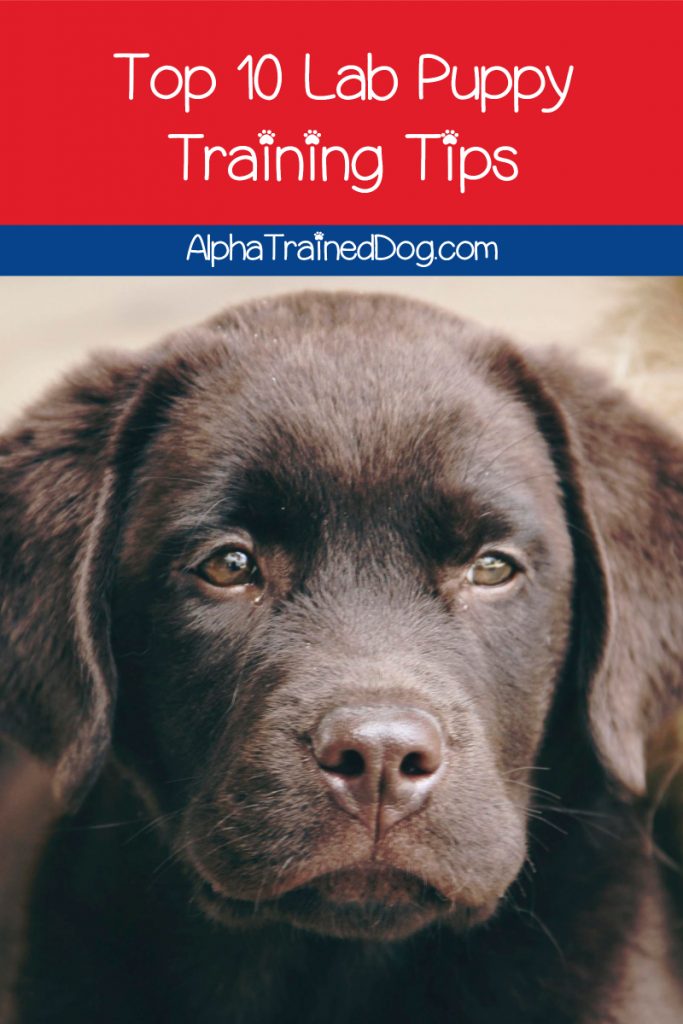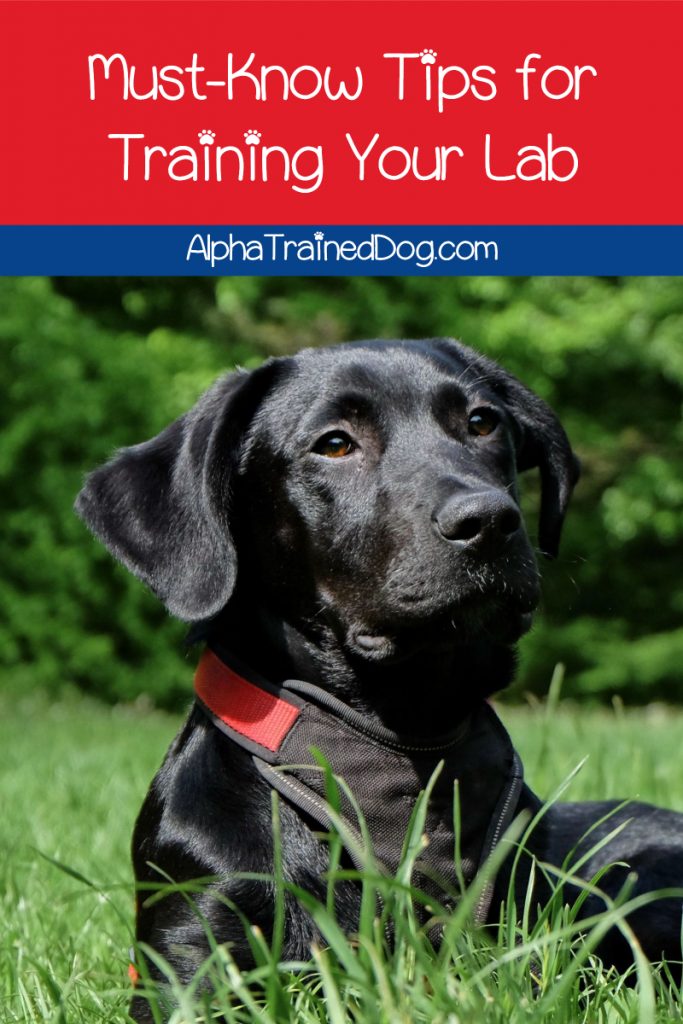If you’re searching for the best Lab puppy training tips, then we’ve got you covered!
I’ve gathered 10 awesome tips that will make training your Lab easier than ever.
Just keep on reading.
You may also love Best Tips For Training Your Golden Retriever

Table of Contents
10 Lab Puppy Training Tips
Labradors are among one of the most popular dog breeds because of their sweet disposition, gentle character, and friendly nature.
They also have the reputation of being one of the easiest dog breeds to train.
But while your Lab might be easy to handle, every puppy needs training to mature into a well-behaved dog.
So, here are 10 tips that will help you survive training your Lab puppy.

#1 Learn What Motivates Labs to Obey
Labrador Retrievers are so popular that you might think that you know everything about them.
But learning everything about the breed will help you train your Lab puppy more successfully.
For example, Labradors are highly motivated by food, so they will do almost anything as long as there are treats involved.
That’s why they are so trainable and respond so well to most dog training strategies.
In addition to this, Labradors are very affectionate and love to please their owners. So, never scold or punish your Lab puppy because they don’t react well to harsh treatment.
#2 Start Potty Training Early
How do you train a Labrador puppy to potty? You start the moment you bring your Lab puppy home. Waiting a couple of days might allow your Lab puppy to build a bad habit, which will be twice as hard to break.
So, choose a spot for potty training, take your puppy there, and reward with food and praises whenever the puppy uses it.
You can take a look at this Labrador puppy potty training video to walk you through the process.
#3 Teach Basic Commands
Besides housebreaking your Lab puppy, you should teach your Labrador some basic commands.
I recommend you start with “Sit” because it’s easy to master, and a lot of other commands require your dog to know how to sit.
What’s important is that you reward your puppy immediate after he acts on the command word.
In this way, you’re establishing a connection between the word, the action, and the reward.
After your puppy responds well to “Sit,” you can move to “Come,” “Down,” “Fetch,” and so on.
Take your time to make sure that your Lab puppy has mastered each before you build more complicated actions.
Basic commands will also be handy if you’re thinking about Lab training for hunting.
#4 Reward Good Behavior
Labrador puppy training during the first month home should consist of your puppy learning the house rules.
Your goal is to reward actions you want to encourage and correct behaviors you don’t want to be repeated.
For example, you give the puppy treats and attention when he stays off the furniture, uses his designated potty spot, or stays calm while you’re gone.
When your puppy doesn’t something “naughty” like chewing off the table’s legs, you say a firm “NO!” and remove the puppy from the situation.
Never hit or yell at your puppy because you’ll make your pet afraid of you.
#5 Make Treats Less Predictable
As I already mentioned, Labrador Retrievers are highly food motivated.
However, treats are rich in calorie count, and feeding too much might lead to obesity. That’s why you should break the treats into small pieces at the beginning of training.
Later on, once your puppy has mastered a command, you can slowly phase the treats out and make them less predictable.
What your aim is to reward your puppy every fourth/fifth time obeys a command. By skipping a reward, you stimulate your puppy to think about what they have to do to earn the tasty food. Otherwise, your puppy will get used to easy rewards and won’t reach his full potential.
#6 Teach Bite Inhibition
Puppies bite because they mimic playing with their litter maters or because they are teething.
As many Labrador owners will tell you, Lab puppies tend to bite a lot. As such, they can accidentally hurt you if they haven’t learned bite inhibition.
During playtime, whenever one of the puppies plays too rough, the other puppy will refuse to play.
The mother will also punish the little one if he is nursing too hard. In this way, littermates learn how strong they could bite.
So, how can you train a Lab puppy not to bite? You refuse to play or interact with them and make loud noises when they bite you.
When there is no reward for nipping you, such as attention, the puppy will outgrow the behavior.
#7 Expand the Training
Once your puppy is obeying commands well, it’s time to up your game and add distractions. For example, have a friend bring their dog over while you’re teaching a command or put something distracting in the room.
Your goal is to test the level of response of your puppy and strengthen it. Continue to practice until your puppy obeys every time with minimal hesitations. Then you can start testing the commands outside the comfort of your home.
#8 Be Consistent
When it comes to young puppies training, one of the most important elements is consistency.
Choose your command words carefully because once you start training, changing them will be too confusing for the puppy.
Furthermore, think about what your puppy is allowed to do in the house and what is not.
For example, is your puppy going to sleep in the bed? If not, you should make it clear to the puppy. If you give up once, you’ll give up again.
#9 Avoid Mistakes
When you’re training a Lab puppy, you’re bound to make mistakes. But if you keep these three important Labrador training tips, you will do an excellent job:
- Keep calm. Labradors are easy to excite and need a firm hand to stay in check.
- Use only positive reinforcement to train your puppy. Forcing a Lab to do something will not yield good results.
- Involve the whole family in the training process. There is no point in obedience training if the rest of your family spoil the puppy and undermine your efforts.
In addition to this, you should keep the training sessions short.
Puppies tire easily and have a short attention span. As such, anything longer than 10 minutes is too much for them at a time.
You should have at least two sessions a day in a place with no distractions so that your puppy can focus on what you’re teaching them.
#10 Enroll in Puppy Obedience Classes
Last, but not least in our list of the best Lab puppy training tips is attending obedience classes.
One of the biggest advantages of Labrador training schools is that they help your puppy learn how to behave around other dogs.
In addition to this, attending puppy obedience classes is an excellent idea if you’re don’t have prior training experience.
You can watch how professional trainers do it and ask any questions you might have.
While Labrador Retriever puppies are not as stubborn or challenging to train as other breeds, they still need a lot of patience and time. Remember that no dog is born knowing how to understand your commands.


These are some awesome lab puppy training tips. I used to want a lab, but if we get another dog in the future I don’t know what breed I’d go with.
Labs are such good dogs. My dad had several while we were growing up. They were so smart! I love your tips.
These sound like great training tips. I like how you reduce treats and stop the nipping issues.